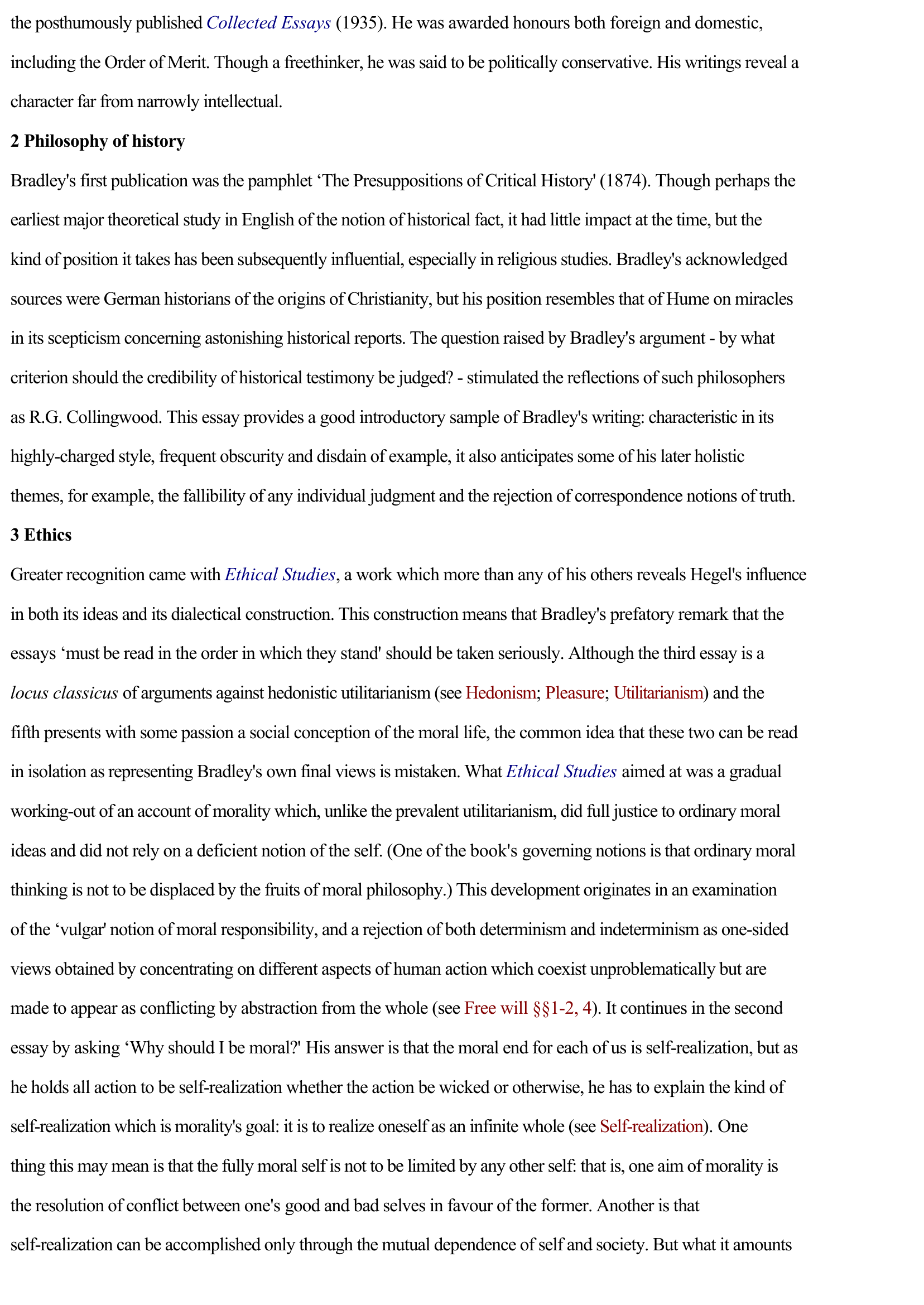Bradley, Francis Herbert
Publié le 22/02/2012

Extrait du document
«
the posthumously published Collected Essays (1935).
He was awarded honours both foreign and domestic,
including the Order of Merit.
Though a freethinker, he was said to be politically conservative.
His writings reveal a
character far from narrowly intellectual.
2 Philosophy of history
Bradley's first publication was the pamphlet ‘The Presuppositions of Critical History' (1874).
Though perhaps the
earliest major theoretical study in English of the notion of historical fact, it had little impact at the time, but the
kind of position it takes has been subsequently influential, especially in religious studies.
Bradley's acknowledged
sources were German historians of the origins of Christianity, but his position resembles that of Hume on miracles
in its scepticism concerning astonishing historical reports.
The question raised by Bradley's argument - by what
criterion should the credibility of historical testimony be judged? - stimulated the reflections of such philosophers
as R.G.
Collingwood.
This essay provides a good introductory sample of Bradley's writing: characteristic in its
highly-charged style, frequent obscurity and disdain of example, it also anticipates some of his later holistic
themes, for example, the fallibility of any individual judgment and the rejection of correspondence notions of truth.
3 Ethics
Greater recognition came with Ethical Studies , a work which more than any of his others reveals Hegel's influence
in both its ideas and its dialectical construction.
This construction means that Bradley's prefatory remark that the
essays ‘must be read in the order in which they stand' should be taken seriously.
Although the third essay is a
locus classicus of arguments against hedonistic utilitarianism (see Hedonism ; Pleasure ; Utilitarianism ) and the
fifth presents with some passion a social conception of the moral life, the common idea that these two can be read
in isolation as representing Bradley's own final views is mistaken.
What Ethical Studies aimed at was a gradual
working-out of an account of morality which, unlike the prevalent utilitarianism, did full justice to ordinary moral
ideas and did not rely on a deficient notion of the self.
(One of the book's governing notions is that ordinary moral
thinking is not to be displaced by the fruits of moral philosophy.) This development originates in an examination
of the ‘vulgar' notion of moral responsibility, and a rejection of both determinism and indeterminism as one-sided
views obtained by concentrating on different aspects of human action which coexist unproblematically but are
made to appear as conflicting by abstraction from the whole (see Free will §§1-2, 4 ).
It continues in the second
essay by asking ‘Why should I be moral? ' His answer is that the moral end for each of us is self-realization, but as
he holds all action to be self-realization whether the action be wicked or otherwise, he has to explain the kind of
self-realization which is morality's goal: it is to realize oneself as an infinite whole (see Self-realization ).
One
thing this may mean is that the fully moral self is not to be limited by any other self: that is, one aim of morality is
the resolution of conflict between one's good and bad selves in favour of the former.
Another is that
self-realization can be accomplished only through the mutual dependence of self and society.
But what it amounts.
»
↓↓↓ APERÇU DU DOCUMENT ↓↓↓
Liens utiles
- PRINCIPES DE LOGIQUE, Francis Herbert Bradley (résumé)
- APPARENCE ET RÉALITÉ (résumé & analyse) Francis Herbert Bradley
- ÉTUDES D’ÉTHIQUE Francis Herbert Bradley (résumé)
- Bradley Francis Herbert, 1846-1924, né à Clapham, philosophe britannique.
- Qui était BRADLEY (Francis Herbert) ?

































